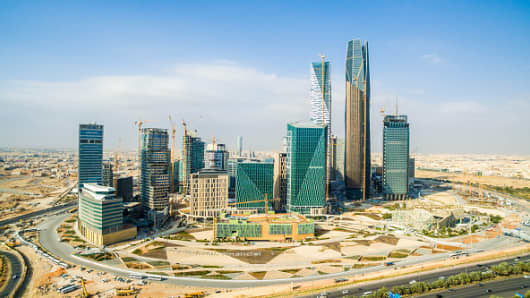Higher oil prices won't change the pace of Saudi Arabia's reforms, the country's finance minister told CNBC Wednesday.
"Higher oil prices will only help reduce the deficit and build reserves, we will continue our reform," Mohammed bin Abdullah Al-Jadaan told CNBC's Hadley Gamble on Wednesday.
"I assure you that there is a lot of excitement about reform and when you see results you get more energy to do more because you can see that it's working and helping the economy," Al-Jadaan said.
Reforms were more than just those helping with government income, he said, rather they were important for Saudi Arabia in its mission to diversify the economy and have a "sustainable income," he said.
"We have had a very successful year over the last year a lot has been achieved in terms of fiscal discipline, the government has been really very efficient in its spending and, overall, non-oil revenue has been as planned or even in certain parts (of the economy) better than planned," he said.
He said that oil revenues are increasing as prices rise, which are helping the country to reduce its deficit, which the government has managed "to reduce by 40 percent in the last two years."
Outlook for the economy 'stable'

Waseem Obaidi | Bloomberg | Getty Images
Skyscrapers stand in the King Abdullah financial district in Riyadh, Saudi Arabia, on Saturday, Jan. 9, 2016.
Al-Jadaan's comments come as Moody's ratings agency reaffirmed Saudi's "A1" credit rating on Wednesday, and said the outlook for the economy was "stable."
It stated that the country's credit strengths included a "strong fiscal position; substantial external liquidity buffers; a large stock of proved oil reserves combined with low extraction costs; and prudent financial system regulation."
The stable outlook, Moody's added, reflected its view that risks to the country's credit profile are broadly balance. "The government's reform program, including the plans to balance the fiscal budget by 2023, could over time offer a route back to a higher rating level," the report said.
Reforms in Saudi Arabia are being overseen by Crown Prince Mohammed bin Salman that are being implemented as part of the kingdom's "Vision 2030."
The program of reforms, ranging from broader rights for women to massive infrastructure investment, are aimed at moving the economy away from its dependence on oil and boosting employment for the predominantly young population.
Other measures have included the introduction of value-added tax (VAT) in Saudi Arabia and the gradual withdrawal of energy subsidies as a way to boost revenues and cut government spending.
Projected budget deficit
Earlier on Wednesday, Al-Jadaan said that the country had a projected budget deficit of 195 billion riyals ($52 billion) in 2018, or 7.3 percent of its gross domestic product (GDP), down from 230 billion riyals last year.
Speaking at a conference in Riyadh, the minister said first-quarter fiscal results showed progress in increasing non-oil revenues, Reuters reported.
Vision 2030 has a goal to increase non-oil government revenue from 163 billion Saudi Arabian riyals (SAR), or $43.4 billion, to $1 trillion SAR by 2030.
The need for economic diversification was hastened by the dramatic fall in oil prices that started in June 2014 amid a global glut in oil supply and lackluster demand, an event that has hit the world's biggest oil exporter, Saudi Arabia, hard. As such, the Saudi economy is likely to have seen its first contraction in 2017 for the first time since 2009.
Asked whether higher oil prices could affect the strategy of Vision 2030, Al-Jadaan said
"Oil prices are a market dynamic. I don't think it's up to oil producers to set the price otherwise we would not have seen prices below $30 a few years ago. It's a market dynamic (based on) supply and demand and we think demand is going to continue," he said.
"Oil is going to be here for an extended period of time and we think a balanced oil price is right for producers and consumers," he said.

